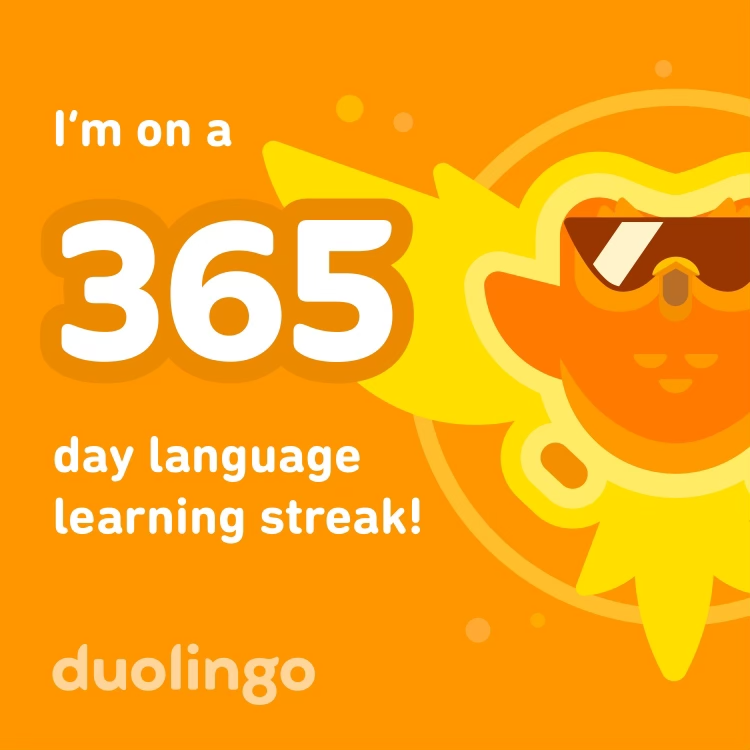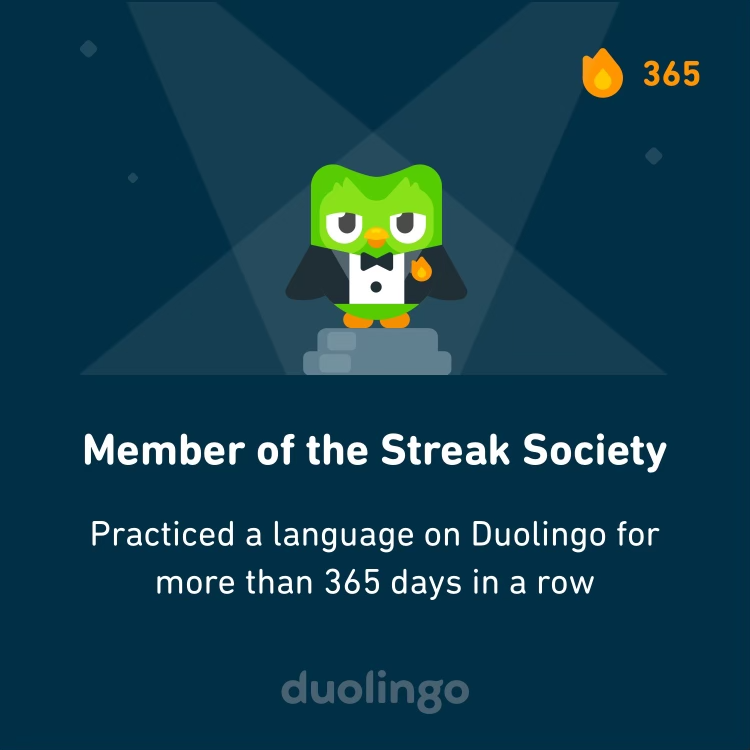2024-03-27
From my friends at Duolingo:
The people that affectionately call their Prince William "Wills" and £5 and £10 notes ~"fivers" and "tenners"~ are responsible for shortening "Association Football" to just "Assoc."—which, when written, looks like it might be pronounced "Assock." (This "Association Football" name is the same as the French Football Association in FIFA!) In late 1800s England, at Oxford, there was also a fad of adding -er to some words. And thus, "soccer" was born.
In England. 🏴
2021-10-13
I'm more proud of this than I have any right to be. This morning I made it to 365 straight days of practicing German on Duolingo. Unsurprisingly, after using it for this long, it's become one of my favorite apps (1).
When I first started using Duolingo, it was as a supplement to tutoring sessions with a teacher, but when we moved from Switzerland, I no longer had the bandwidth for classes. Since then, my German practice has been Duolingo, the NZZ podcast Akzent, and reading the occasional children's book to my daughter. I have to admit, I'm surprised at how effective Duolingo is. I can tell from my other German language activities that I'm better today than I was 3 or 6 months ago.
Here's what I love about the app:
- They've mastered habit building. For me, learning a language is all about reptition and Duolingo is the easiest to use repeatedly. Just like the best camera is the one you have with you, the best language app is the one you use most often. Duoling nails this.
- They have so many overlapping ways that they incentivize good language learning habits:
- Streaks, to get you in the app every day
- Hearts, to incentivize you to not rush through the course
- Experience points, which incentize depth of knowledge
- Gems, which pay off if you reach your goal
- Leagues, which create social pressure / competition
- Badges, which reward continued investment
- Crowns, which reward completing lessons
- "Cracked" lessons, which reward revisitng material. I think this is everything, but I'm probably missing something.
- The overall playfulness of the app, which comes out in the sounds they use when you're right or wrong, and the characters that they use in their lessons
After 365 days, here's what I wish they'd do differently:
- I'm never sure if I'm using my time in the best possible way. Learning a language is a tradeoff between picking up new material and going back and practicing mistakes. All the features Duo has makes it tough to know if I'm in the right spot. I wonder if there is a TikTok-esque version that drops you in and just drills you based on where you stand algorithmically.
- Duo really isn't great at reading comprehension. They have a stories feature that helps with this, but it's sort of off to the side. As a user, I'm left to figure out how to integrate these two experiences (which is basically my previous criticsim).
- They haven't solved speaking practice. They have cool features that get you to pronnounce words, but there's nothing like live conversation and having to truly think in another language. They have an "events" feature where you can join free or paid groups, but it's super buried.
- I'm surprised they don't have a platform for language teachers. I would happily sign up for a 30 min or 1 hr weekly practice session with a language teacher, yet I'm left to go off platform to find this person. When I find them, the first session is going to be an assessment, which Duolingo should be well positioned to provide.
- I can't believe they don't have gear (t-shirts, hoodies) or digital stickers that you can buy that only gets unlocked once you get to a certain level. Seems right up their alley. So here's to another year. I sort of imagine that afer I progress to a certain level, I'll need other resources. But we'll see!
1: I'm obligated at this point to mention that Duolingo is a Pittsburgh company

